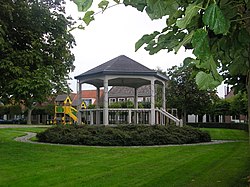Nieuwerkerk
Former municipalities of ZeelandHistory of Schouwen-DuivelandPopulated places in ZeelandSchouwen-Duiveland

Nieuwerkerk is a village in the Dutch province of Zeeland. It is a part of the municipality of Schouwen-Duiveland, and lies about 23 km south of Hellevoetsluis. Nieuwerkerk was a separate municipality until 1961, when the new municipality of Duiveland was created.
Excerpt from the Wikipedia article Nieuwerkerk (License: CC BY-SA 3.0, Authors, Images).Nieuwerkerk
Deltastraat, Schouwen-Duiveland
Geographical coordinates (GPS) Address Nearby Places Show on map
Geographical coordinates (GPS)
| Latitude | Longitude |
|---|---|
| N 51.648611111111 ° | E 4.0011111111111 ° |
Address
Deltastraat 12
4306 BK Schouwen-Duiveland
Zeeland, Netherlands
Open on Google Maps







